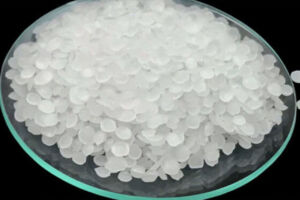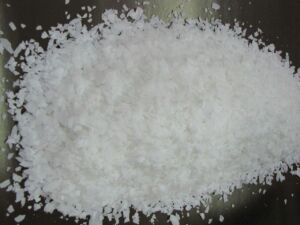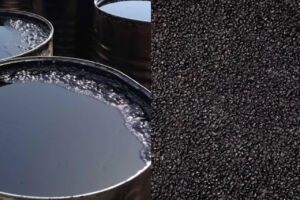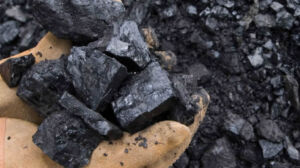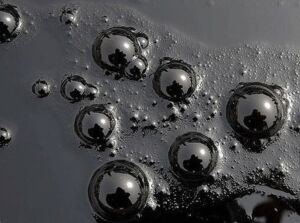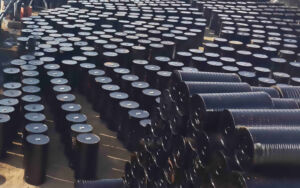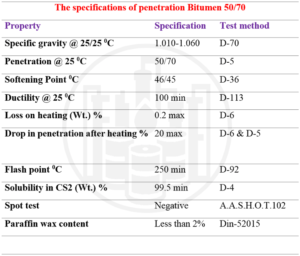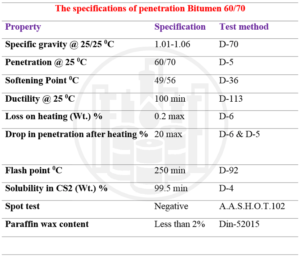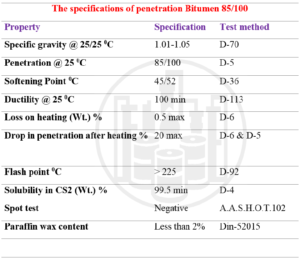Bitumen is a black and paste-like material that is used in moisture insulation and asphalt construction.
Bitumen is usually obtained from the distillation of crude oil. Such bitumen is called petroleum bitumen or distillate bitumen. Oil bitumen is the product of two stages of crude oil distillation in the distillation tower. In the first stage of distillation, light materials like gasoline and propane are separated from crude oil. This process is carried out at a pressure close to one atmosphere (unit). In the second stage, heavy compounds like diesel and kerosene are removed. This process takes place in a pressure close to vacuum. Finally, a mixture of very fine solid particles called asphaltene remains, which is immersed in a grease-like fluid called maltene.
But some types of bitumen are obtained in nature as a result of the gradual transformation of crude oil and the evaporation of its volatile substances over many years. Such bitumen is called natural bitumen and its durability is longer than oil bitumen. Such bitumen may exist in pure form in nature (lake bitumen) such as Behbahan Bitumen Lake in Iran and Trinidad Bitumen Lake in America, or it may be extracted from mines.
There are different types of bitumen, each of which has a specific application. Bitumen is a petroleum derivative.
Bitumen is a black to dark brown hydrocarbon material that dissolves completely in carbon sulfide and carbon tetrachloride.
Bitumen is solid at ambient temperature. But with increasing temperature, it turns into a paste and then becomes liquid.
The important use of bitumen is due to the existence of two important properties of this material;
* Impermeable to water
* Stickiness
Types and sources of bitumen and applications
Bitumen is a hydrocarbon substance that has a definition, characteristics, sources and special characteristics. Bitumen materials are more diverse than oil, because bitumen has other sources besides oil. Bitumen are divided into three categories depending on their origin:
- Natural bitumen
- Petroleum bitumen
- Tar pitches
Natural bitumen
Natural bitumen, which is also known as bentonite, asphaltite, natural asphalt, decorative asphalt, asphaltum and mineral bitumen, is a natural hydrocarbon resin and is the best waterproofing in nature. Natural bitumen is a shiny, black and very brittle substance in lump form, and in micronized powder form, it has a dark brown color. Natural bitumen is found underground in vertical layers. Natural bitumen is a naturally occurring hydrocarbon resin that has been rediscovered in recent history in the Bonita River in northeastern Utah. This natural asphalt is similar to a hardened crude oil asphalt. Usually, the names asphalt, yutanite and asphaltum are also used for this material. Natural bitumen is soluble in aliphatic and aromatic solvents like natural asphalt. Due to the high compatibility of this product, it is usually used to harden diluted petroleum derivatives.
Natural bitumen in lump form is a shiny, black material, very similar to obscenity, and very brittle, and in micronized powder form, it has a dark brown color. Natural bitumen is found underground in vertical layers. Because of the narrow mining front, natural bitumen today is extracted using excavators, loaders, hammers and other new mechanical tools.
Properties of natural bitumen
Natural bitumen consists of a class of solid bitumen known as asphaltites and is distinguished from other asphaltites due to the following characteristics:
Natural bitumen has characteristics such as high solubility in organic solutions, high purity and stable properties, high molecular weight and high nitrogen content.
Natural bitumen is an organic material, hydrocarbon and the best moisture insulator in nature. Also, it has a softening point of 130 to 250 degrees Celsius, depending on its type and quality, and it improves its importance in construction uses and thermal insulation, and as a primary material and substitute additive and modifier in many uses. It is used for construction projects and especially for road construction.
Petroleum bitumen
Petroleum bitumen are solid and semi-solid bitumen obtained directly from the distillation of crude oil or by other additional operations such as blowing air. Oil bitumen is the residue or heavy residue of crude oil distillation. The amount of bitumen in crude oil varies from zero to more than half of it. In addition, bitumens obtained from different sources can have many differences. Therefore, bitumen producing refineries must choose their crude oil carefully to ensure the quality of bitumen
Distillation is a fundamental process in refining crude oil. The first stage of distillation is done under atmospheric pressure and usually involves heating the crude oil to a temperature of about 650 to 800 degrees Fahrenheit and then injecting it into a separation column. In this way, the lighter cuts are called as the top product of the tower and the bitumen residue is called atmospheric residue. This is the first step in the entire purification process. Many crude oils contain high percentages of high-boiling fractions that cannot be distilled in an atmospheric still. To separate these cuts and prepare bitumen with desired characteristics, a secondary separation tower that works in vacuum conditions is used.
The remainder of this process is called direct extraction bitumen. Asphalt production process by vacuum distillation method has very little effect on other bitumen properties except permeability. The origin of the used crude oil also has a significant effect on the physical properties of extracted bitumen.
Tar pitch
Types of bitumen Chemically, there are different classifications for bitumen, two of the most common of which are the classification based on whether the bitumen is natural or petroleum, and the more common one is based on the type of bitumen source, i.e. oil, coal, or wood.
Bitumen: This type of bitumen is sometimes known by the same name due to its appearance and use similar to petroleum bitumen. Because the source of this type of bitumen is different from petroleum bitumen, it has different chemical composition and physical properties, which is a general word for liquids. Tar has a different behavior during use and performance in service than burning natural organic materials such as wood or coal and their destructive distillation in the absence of air. Two types of tar can be prepared from coal burning or carbonization according to the type of process: 1. a process that results in bitumen with a high percentage of aromatics, which is obtained at a temperature of 600 degrees Celsius. And it has a low percentage of triaromatics, which is the residual material of coal tar after cooling the vapors and separating the oily fractions.
BS is obtained with oil cuttings, and in Pitch standard, it is produced by mixing (refined tar) refinery tar bitumen, which has 8 different grades after tar and pitch. In the era of industrial revolution in Europe, a large amount of oil and gas resources appeared, coal was almost abandoned and its consumption was greatly reduced.
Today, 90% of these products are used in four functional groups: road construction, mold coal slag, charcoal electrodes, and pipe glazing and coating. But the use of bitumen obtained from refinery coal in roads is only limited to the mixture for surface coatings. And this is the reason that these bitumens are more soluble and perform better at low temperature, and as a result, they create better adhesion. But the main weakness of these bitumen is its higher thermal sensitivity than petroleum bitumen.
Four applications of tar:
- Road construction (Road Tar)
- Briquetting
- Charcoal electrodes (Electrode Binder)
- Glazing and covering of pipes (Pipe Enamels)
The use of bitumen obtained from refined tar on the road is limited only to bituminous-tar mixture for surface coatings. The coal bitumen used in this mixture is more soluble at low temperature and has better performance. In general, it is believed that because the acidity of tar is high, it creates good adhesion with materials.
Therefore, wetting of materials is better and adhesion is improved, but due to environmental problems and the development of chemical adhesion agents, the use of tar is limited. Although the use of tar can be used in vehicle parking areas and similar cases due to the fact that tar is less affected than oil and diesel leaks. However, the main defect of tar can be considered to be its greater thermal sensitivity compared to petroleum bitumen.
Bitumen specifications
- Degree of penetration:
Penetration degree test is used to determine bitumen hardness. In this test, it penetrates into bitumen at a temperature of 25 degrees from a standard needle under the effect of a load of 100 grams in 5 seconds. The penetration value in tenths of millimeters is called the penetration degree. The lower the penetration degree, the harder the bitumen.
- Viscosity:
The higher the viscosity of bitumen, the more solid properties it exhibits. Obviously, at higher temperatures, the mental retardation is less. This characteristic of bitumen is measured with C-bolt Fiorel device or by kinematic method.
- Flammability degree:
The degree of ignition is the temperature at which if the bitumen reaches that temperature, the gases emitted from it will ignite as the flame approaches and a flame will appear on its surface. The maximum temperature that bitumen can be heated in the workshop is limited to the degree of ignition.
- Weight loss:
The weight loss of bitumen at high temperature is due to the evaporation of part of its oils and petroleum compounds. This characteristic is also one of the important properties of bitumen. The weight loss of bitumen is measured in the oven at 163°C for 5 hours (approximate conditions of asphalt curing).
- Plasticity or stigma:
If we pull a sample of bitumen with a cross-sectional area of 1 cm2 at a speed of 5 cm/min, the increase in the length of the sample before breaking is called the anemic property of bitumen.
- Degree of purity:
We know that the solvent of bitumen is carbon tetrachloride and carbon sulfur. Therefore, if we dissolve a sample of bitumen in any of these materials, its impurities will remain and from there we can determine the degree of purity of the bitumen. The degree of purity is: (bitumen sample weight) ÷ [(impurity weight) – (bitumen weight)]
- Degree of softness:
Softness degree is the temperature at which bitumen turns from solid to liquid when bitumen reaches that temperature. The higher the degree of bitumen softness, the less sensitive it is to temperature changes. The degree of softness of ordinary bitumen is about 60 to 70.
Bitumen 50/70
Bitumen 50/70 is used to produce asphalt and it is mainly used for surface coating in the production of hot asphalt.
The most used and bought and sold types of bitumen is 50/70 bitumen and it is a raw material for other bitumen products.
Bitumen with a penetration degree of 50-70 has a penetration degree of 5-7 mm and its softening point is between 49-56.
This degree of bitumen penetration has thermoplastic properties, which is similar to synthetic resin, it becomes softer when heated and hardens when cooled.
This 70-50 bitumen grade has a very strong viscosity compared to other bitumen grades and it is widely used.
The bitumen permeability test is used to determine the relative hardness of blown bitumen and pure bitumen.
One of the uses of the degree of penetration is to determine pure bitumen and blown bitumen.
Pure bitumen is named only on this basis, but the criterion for naming blown bitumen is not only the degree of bitumen penetration, but also the degree of thinness of bitumen.
For example, bitumen 50/70, 60-70, 85-100 and percentage of bitumen are common pure bitumen in road construction.
The two numbers (50/70) that are associated with pure bitumen show that the penetration degree of bitumen is within this limit.
Bitumen R85 / 25, R90 / 15, R110 / 10 and … are common types of blown bitumen in Iran, the first number indicates the penetration rate of bitumen and the second number indicates the soft point of bitumen.
As explained, bitumen penetration is the length (in millimeters) of a standard diamond-shaped needle.
It penetrates bitumen at a temperature of 25°C for 5 seconds under a load of one hundred grams.
The specifications of bitumen 50/70 are listed in the table below:
Bitumen 60/70
Among the bitumen products of Sepahan Qirji Company is bitumen with a permeability of 60/70. Bitumen 60/70 is a penetrating bitumen. Permeable bitumen or road grade, which are mostly used to produce asphalt in the road construction industry, are obtained by performing an aeration process on the residue of the distillation tower, which is known as vacuum baton, so that the degree of permeability is between 60 and 70. This bitumen is purchased in the form of a seal from Naftji and Pasargad refineries, and it is unloaded at the Sepahan Qirji factory and packaged in standard export barrels of 160, 190, 210, and 240 kg with the highest quality and in accordance with international standards. In terms of the place of use, 60/70 bitumen is more suitable for temperate climates.
The specifications of bitumen 60/70 are given in the following table:
Bitumen 85/100
Bitumen 85/100 is used to produce asphalt and it is mainly used in the production of hot asphalt for surface coating. The most commonly used type of bitumen is 85/100 bitumen, and it is a raw material for other bitumen products.
The degree of bitumen penetration produced by Darsa Bitumen Company is pure petroleum bitumen produced by passing hot air through the raw material of vacuum Batum. This bitumen is produced after cracking and removing its hydrocarbon and from the residue of crude oil.
Bitumen with a permeability degree of 85-100 has a penetration degree of 8.5 to 10 mm and its softening point is between 45 and 52.
Bitumen penetration degree 85-100 has thermoplastic property, which is similar to synthetic resin, it becomes softer when heated and hardens when cooled. This bitumen grade of 85-100 has a very strong viscosity and is widely used.
The specifications of 85/100 bitumen are given in the table below:
Soluble bitumen:
Soluble bitumens are obtained by dissolving bitumen in solvents or petroleum oils.
The type and quality of soluble bitumen depends on the quality of bitumen, the type of solvent and the amount of solvent.
The greater the amount of petroleum solvents in the bitumen solution, the higher its flow ability.
Lack of access to bitumen heating devices, bitumen decomposition at high temperatures, bitumen cooling during work, impossibility of its penetration into porous mineral materials,
The necessity of safety of workers, fire and waste of time causes that soluble bitumen is used in some cases.
Soluble bitumen is used in road construction for surface coating, infiltration, surface asphalt, cold asphalt of factories or mixed on site.

